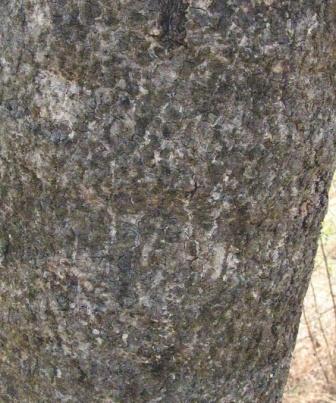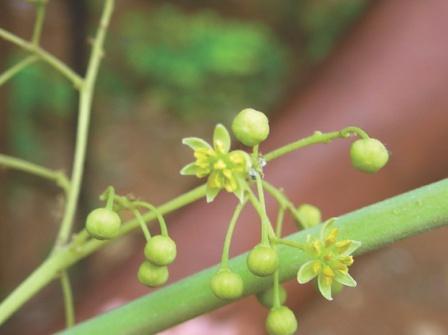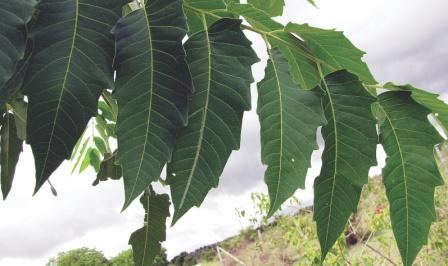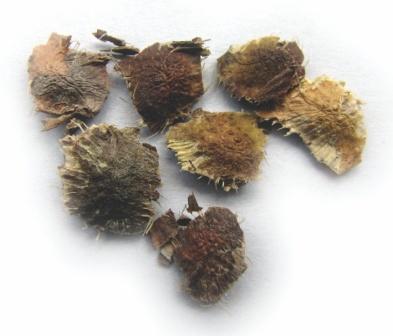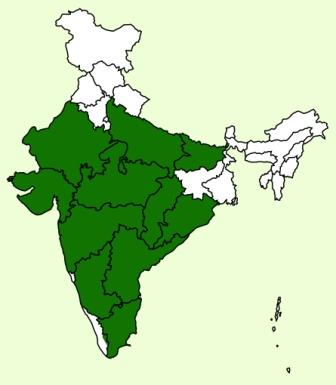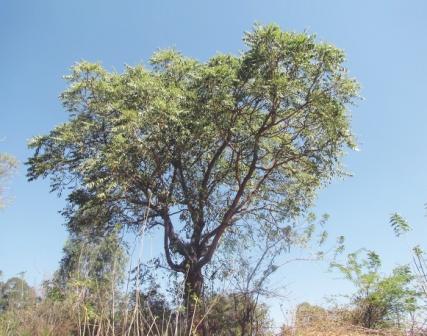Natural Regeneration :
- Reproduces itself through seeds, coppice and root suckers.
Artificial Regeneration :
- It can be established by direct sowing, and nursery raised seedlings.
Seed collection and Storage :
- The fruits ripen March to May.
- Ripe fruits are collected off the trees before these are blown away by the wind.
- Seeds are dried in the shade.
- Seed viability is very short and stored only for 3 months
- Seed weight is 7500-10000/kg
- Germinative capacity 70-90 %
Seed Treatment :
- No pre-treatment is required.
Nursery Technique :
- The nursery soil should be light, porous and well drained.
- Indofil may be mixed with the soil to avoid insects and ants.
- The seed beds should be well raised to allow drainage. (In the absence of beds seeds can also been sown in polybags).
- Seed sowing should be done in mother beds.
- After broadcasting the seeds, cover the seed lightly with about 1 cm of sand.
- Only a mild watering is required.
- Excess water will lead to damping off disease in seedlings.
- The germination is epigeal that starts 8-14 days after sowing and complete in 25-30 days.
- After 3 weeks maintenance in 5-10cm collar diameter seedlings can be transplanted into 10cm X 20cm polybags.
- The roots are very delicate and fragile and require special attention during transplantation.
- 15 gm of seeds are required for sowing 1 sq. m of bed.
- Mixing of seeds with ash or pulverized soil ensures uniform sowing.
Plantation technique :
- 30 cm3 pits and the soil are allowed to weather.
- Planting is to be carried out in the month of July or October based on the monsoon pattern in the region.
- For block planting nursery raised seedlings 6 to 10 months are used for planting in pits at a spacing of 3 x 3m or 5x 5m.
- Regular watering and protection from browsing is required till the saplings get established.
Care & Disease Control :
- Plantation should be weed free with soil conservation measures.
Plant Protection Measures:
- Defoliator viz, Atteva fabriciella, and Eligma narcissus;
- The borer Batocera rufomaculata and the fungi (leaf spot) Cercospora glandulosa and Alternaria spp are the major pests in Ailanthus excelsa cause severe damage.
- Seedlings are susceptible to damping off disease therefore heavy watering should be avoided and only optimum level of moisture should be maintained.
- For controlling insect pests, spraying or dusting with BHC is carried out.
- Severe defoliation affects plant growth and may cause death of the plant.
- Application of malathion will manage the insect pest to a considerable extent.
- Application of 1% Hy-Act (Bio pesticide product of IFGTB) as a foliar spray reduces Eligma narcissus infestation about 65-70%.
Irrigation :
- Arid and Semi arid areas watering - regular watering in initial stage.
- No watering is required in moist areas.
Recommended Harvest :
Approximately 5-7 years
Yield :
- In Tamil Nadu, about 50-75 t/ha at a rotation of 5-7 years was realized through seed raised plantations with un irrigated conditions.
- But in the irrigated conditions the yield is up to 120-135 t/ha in 5-7 years rotation.
Agro Forestory :
- Can cultivate all types of crops such as agricultural and horticultural crops except rice.
Major uses :
- A.excelsa is an indigenous species fast-growing tree species suitable for raising industrial plantations.
- More than 70% of the wood goes to the safety matches Industry.
- It is used for packing cases, fishing catamarans and floats.
- It is suitable for commercial plywood and Eri silk production as a host plant.
- Leaves are highly palatable and nutritious fodder for sheep and goats.
Market details :
Approximately Rs.7000 - Rs.8000/ton*
*Subject to change according to Market Demands


